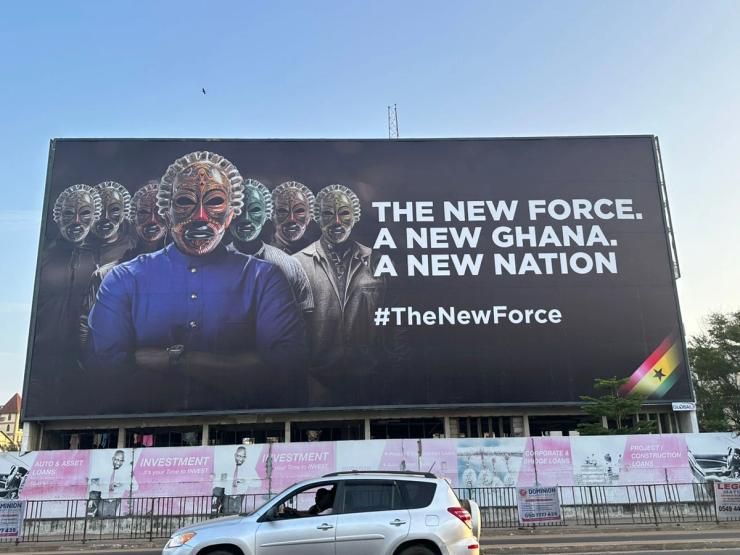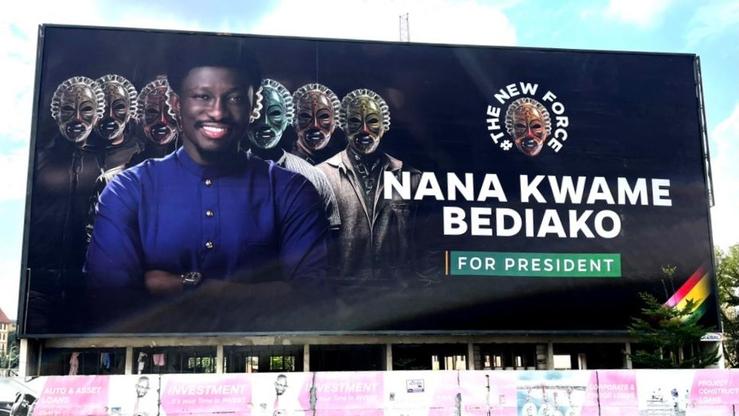The News
ACCRA, Ghana — A wealthy Ghanaian businessman revealed he is the masked presidential candidate featured on billboards that appeared across major cities in recent weeks. But his launch was most notable for highlighting the government’s apparent fear of a new youth-led populist movement similar to others sweeping the continent.
Nana Kwame Bediako, a property developer popularly referred to as Cheddar, had geared his unveiling around a convention featuring high profile populist figures who have garnered support from young voters, including Peter Obi — who came third in last year’s Nigerian presidential election — and the leader of South Africa’s far-left Economic Freedom Fighters party Julius Malema who was due to speak via video call. Other planned speakers included former African Union representative to the U.S., Ambassador Arikana Chihombori-Quao.
However, military personnel swooped in to prevent people attending the event at Black Star Square, in the capital Accra, shortly before it was due to begin on Sunday. A letter from the Ghanaian president’s office, seen by Semafor Africa, stated that a permit issued on Nov. 11 to use the site had been revoked due to “an unforeseen state event scheduled to take place at the venue.” The letter was dated Jan. 7 — the same day as the event.
The political figures who were due to deliver speeches at the Accra event later addressed a press conference at a hotel in the city, during which Bediako revealed that he was behind the New Force campaign that aims to challenge Ghana’s two main parties.
“I’m not going to be scared off. I came to you as your salvation,” said Bediako during a speech in which he said his aspirations lay beyond running to be president in Ghana’s election in December. Billboards bearing the message “Nana Kwame Bediako for President #thenewforce” had been posted around Ghana within 24 hours of the businessman’s event being canceled.
Know More
Populist movements have rocked the political establishment in many African countries, such as Nigeria and Senegal, by galvanizing young citizens. Putschists in West and Central Africa who said they carried out coups to protect the interests of ordinary people have partly been able to remain in power due to a degree of popular support from young people.
Peter Obi, whose support from young Nigerians in last year’s election campaign enabled him to challenge the country’s two main parties, said he traveled to Ghana to take part in the event because he felt Africa has “suffered” due to “failed” leadership. “We want to start a conversation talking to the youth of Africa,” he told the press conference.
Nana Oye’s view
The cancellation of the New Africa Convention came as a surprise to many but Ghana’s government is clearly unwilling to accommodate events that could make it look bad in an election year. The move to use security forces to enforce the cancellation suggests a deeper fear that the populism gripping some young people elsewhere in the continent could spread to Ghana.
Ostensibly, the move smacks of paranoia — particularly coming only weeks after the New Force’s spokeswoman was arrested. It all points to a concerted effort to shut down a nascent party. The chances of a new party bringing a new president to power are very slim. It would take time, money and a nationwide party infrastructure to break the political duopoly enjoyed by the main parties. But Ghanaian authorities have reasons to be worried.

Ghana is still grappling with the worst economic crisis in a generation which has seen the cost of living for people skyrocket, leading to widespread frustration. And the fact that just two parties have governed since the move to multi-party democracy in 1992 means young adults, who have never experienced another form of leadership, could be hungry for change.
The West African country has in recent years been politically stable despite the unrest that has consumed other countries in the subregion. But individuals elsewhere have shown that the established order can be upended. Obi, in Nigeria, engendered intense loyalty from a new generation of politically conscious supporters known as “Obidients.” And in South Africa the ruling ANC could be forced to turn to Malema’s EFF to form a coalition government for the first time if it falls short of a majority in elections this year.
Bediako, who will turn 44 next month, offers something radically different to Ghana’s political mainstream, much like Obi and Malema, or Donald Trump and Boris Johnson in the West. Bright Simons, research lead at Imani Centre for Policy in Accra, told me that “Cheddar”, as he is widely known, is looking to develop a cult-like following. “Think of him as a cross between a modern megachurch televangelist and a miracle drug salesman.”
Room for Disagreement
Bediako’s claim that he offers Ghana “salvation” has prompted ridicule in some circles, particularly since it’s at odds with his image as a flamboyant public figure with a penchant for ostentatious displays of wealth such as keeping pet tigers.
A Ghanaian TV and radio host who goes by the stage name Afia Schwarzenegger likened him to the organizer of a Ponzi scheme. “Not all that glitters is gold,” she said in an Instagram post.
Priscilla Afriyie, a seamstress in the Labadi district of Accra, questioned the businessman’s credentials and said he isn’t qualified to be president simply because he is wealthy. “What has he done in communities? For me, what I see is flaunting of assets, that’s all I know and see,” she told Semafor Africa.
The View From Senegal
Senegal, like Ghana, is widely considered to have been among Africa’s healthiest democracies in the last few decades. But anger over the barring of opposition leader Ousmane Sonko from participating in next month’s election has sparked protests in recent months led by his youthful supporters.
The Supreme Court on Friday ruled against his appeal of a libel conviction, dealing another blow to his hopes of competing in the Feb. 25 election. Under Senegalese law, he can’t take part in the presidential race with such a conviction.
The 49-year-old, who came third in the 2019 presidential election, has been fighting various court cases since 2021 but says charges leveled against him are politically motivated. The electoral commission is due to provide a final list of cleared presidential candidates by Jan. 20.
Notable
- Freedom of expression has long been a cornerstone of Ghana’s stable democracy but Al Jazeera has reported a surge in attacks on journalists by political actors and security agencies ahead of this year’s elections.
— Additional reporting by Steve Clemons



